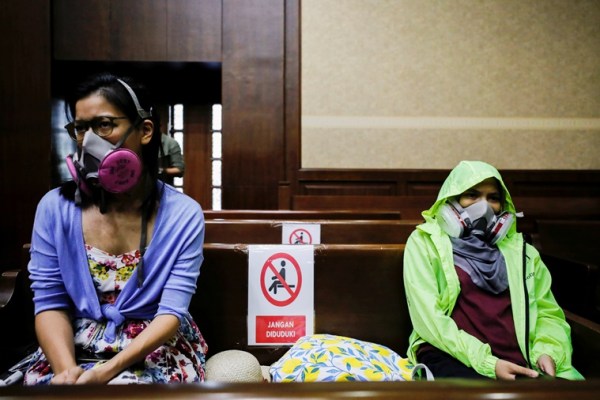Indonesia’s Central Jakarta District Court on Thursday ruled partially in favor of Jakarta residents, taking the country’s president and six top senior officials to court over air pollution.
“All the defendants have committed an unlawful act,” said one of the judges, Sayifuddin Zuhri, while delivering the verdict in the landmark case.
The court asked President Joko Widodo to improve air quality across the country to a level that does not harm citizens’ health or harm the environment and is consistent with scientific research.
Other top ministers and governors were also ordered to take several steps to tackle air pollution.
While the court agreed with most of the plaintiffs’ cases, the judges dismissed the charge that the defendants’ actions violated human rights.
An environmental activist carrying a doll holds a placard outside the Central Jakarta Court after hearing a civil suit in an effort to prosecute the government for acting on chronic levels of the city’s air pollution, in Jakarta, Indonesia, on September 16. Is. 2021. (Reuters)
court case background
In 2019, Jakarta was ranked as the city with the worst air quality in the world, according to AirVisual, a website that monitors air quality around the world.
Inspired by a period of dense fog, more than 30 Jakarta residents filed a lawsuit in Central Jakarta District Court in July 2019. He called on the government to provide policies in support of the environment and clean air for its citizens.
In addition to the president, he filed complaints against the ministers of environment, health and home affairs, as well as the governors of DKI Jakarta, West Java and Banten province.
City air pollution remains high: QAir’s World Air Quality Report for 2020 said Jakarta was the ninth worst capital city globally in terms of levels of PM.2.5, or particulate matter, an air pollutant that can be dangerous to human health. high level.
Key points of the court’s decision
In addition to improving air quality in the country, the court ruled that the president is also required to “monitor DKI Jakarta, the governor of Banten, and the governor of West Java, in the list of DKI Jakarta’s cross-border emissions.”
The judges required the Minister of Home Affairs to calculate the harm to health in relation to air pollution in Jakarta. The calculation should be used as a basic consideration by the governor of Jakarta when preparing an action plan to control air pollution.
The governor must also enforce sanctions for violations, including motorcyclists who do not comply with emissions standards in their vehicles.
“The public should be informed about this policy immediately, which also includes new quality standards for emissions,” Zuhri said.

The reason for the celebration?
Greenpeace’s Bondan Arianu welcomed the decision, saying: “The main point is that the panel of judges said the defendants acted against the law.”
“We can say that it is a success for the citizens who filed the suit given by the judge … but sadly” [harmful air pollution levels] It is not treated as an act against human rights,” Bondan told DW.
He said it is important that citizens monitor the government to ensure that they act as per the decision.
One of the plaintiffs, Khalisa Khalid, said he felt grateful and relieved of the decision, even though it was only partially granted. “For us it was a victory, at least all the important decisions were given and the negligence of the government was proved,” he said.
Another plaintiff, Alyssa Sutnudja, said she still had doubts: “I’m not satisfied … we don’t want any compensation, we just want to improve emissions standards and reduce emissions of major air pollutants such as coal power plants.” Want to review projects. Less,” she said. She said she was looking forward to a change in public policy.
The plaintiffs’ legal team, Age Eza Tiara, said the judges’ decision worked in favor of all citizens. She said she expects the defendants to accept the verdict and focus on making efforts to improve air quality immediately, rather than filing an appeal.
Presidential spokesman Fazroel Rahman said the decision on further course of action would rest with the environment minister, news agency Reuters reported.
Jakarta’s governor’s office said they were reviewing the decision.

Clean air still not a priority
Puji Lestari, an environmental engineering researcher at the Bandung Institute of Technology (ITB) in West Java province, told DW ahead of the verdict that many people in the country still prioritize the economy over air quality.
He said that it ignores that clean air plays a very important role in human life and it affects the economy.
“People don’t know about it” [the impact] of air pollution before they realize it directly. Usually, when people are affected, such as by smog, the visibility becomes very low, they suddenly realize it,” Puzzi Lestri told DW.
“Air pollutants that enter the lungs can cause pneumonia, bronchitis and asthma. long term effects [of these illnesses] serious illness, loss of productivity, inability to work and loss of sources of income,” she explained.

How can Indonesia tighten the noose on air pollution?
Dodiak R Noorochmat, environmental expert at Indonesia’s Bogor Agricultural Institute (IPB), suggested the government could impose fines to ensure law enforcement.
The government can do this by setting a certain limit on emissions at a specific site. If the site exceeds this limit, the firm will be bound to stop operations until the new pollution standards are met. That way, the factory doesn’t emit more, he said.
Another approach, known as the reliability approach, would still allow the business to operate, as well as improve the quality standards set by the government. Victims who are lawfully harmed or affected by pollution during this period will be entitled to receive compensation from the business, such as for medical treatment or daily living expenses.
“Which will be implemented in Indonesia? depends on. As far as I know, these are the two approaches that can be used here,” he said.
.